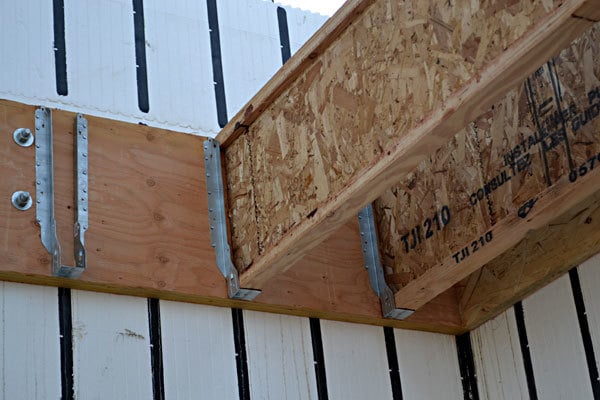How To Set A Wall Under Floor Joists

Plumb the wall and anchor the wall to the joist and subfloor with the nail gun.
How to set a wall under floor joists. Floor frames must be designed to carry the load. The outside of the rim joist is flush with the stud wall beneath to ensure that the house boxing and siding will be even. The maximum depth of a notch at the end of a joist where it rests on a wall or beam can t exceed one quarter of the joist depth. Run a stud finder along the ceiling to locate the joists.
Floor joists are typically 2 by 8s 2 by 10s or 2 by 12s. Beams under the floor joists allow the floor joists to go over. Beams in the floor require joist hangers. The rim joist sits vertically on top of the sill plate along the outside of the frame to create a lip for the main floor joists.
Begin wall assembly by planning the layout of the new wall. A floor s framework is made up mostly of wooden joists that run parallel to one another at regular intervals. Sheeting the floor with osb or plywood. Limit the length of notches to one third of the joist depth.
If the joists are parallel to the new wall adjust the layout so that the wall is directly under a joist. The rim joist boards typically 2 by 10s or 2 by 12s install edgewise around the perimeter of the first floor top wall plate also called the tie plate. Use a chalk line to mark where you want to place the new wall along the floor. Ceiling joists are usually 2 by 6s or sometimes 2 by 4s if it is an older home.
Some newer homes have manufactured i beam shaped joists. Cantilevers allow the floor to be framed out past the foundation. Tilt the wall onto its bottom plate and hoist it upright. The load capacity of the floor under the tub is based primarily on the size spacing and span of the floor joists.
Space nails at least 24 inches on center or according to local requirements. Stairway and balcony openings are framed using bearing walls or beams below. Cut and install the floor joists between the rim joists. Maximum notch depth in the outer third of a joist is one sixth of the joist depth.
For most jobs 2 in 5 1 cm x 10 in 25 cm boards are an ideal size.














































